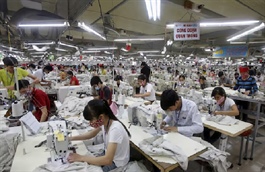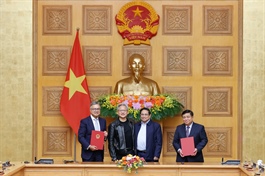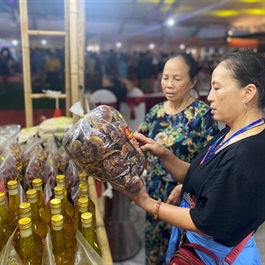Temu keen on business in Vietnam, speeds up registration procedures
Temu keen on business in Vietnam, speeds up registration procedures
Temu, a Chinese cross-border e-commerce platform, is working with relevant authorities and accelerating formalities to resume its provision of e-commerce service activities in Vietnam after it was told to halt operations in the Southeast Asian country due to incomplete registration procedures.

Vietnamese consumers buying products on Temu are concerned over the suspension of the e-commerce platform's operations in Vietnam. Photo: Tuoi Tre |
Since early this week, Temu has suspended its operations following a request of the Vietnamese Ministry of Industry and Trade.
The ministry made the move as it had failed to meet an end-November deadline for business registration with local authorities.
Vietnamese has been removed as an interface language on Temu’s app and website. Users in Vietnam now have the options of English, Chinese, and French.
Goods ordered on Temu were no longer being cleared through customs in Vietnam.
The customs clearance of goods traded through Temu will not resume until the platform obtains a license.
The Vietnam e-Commerce and Digital Economy Agency told Tuoi Tre (Youth) newspaper that Temu had submitted an application for a license to provide e-commerce services in Vietnam through the e-commerce management portal (online.gov.vn) and the application is still under consideration.
Temu has supplemented missing documents as required.
The Vietnam e-Commerce and Digital Economy Agency also required Temu to inform its customers that it is in the process of registering the provision of e-commerce services with the Ministry of Industry and Trade.
The move helps consumers understand that the Ministry of Industry and Trade has not licensed Temu’s website and app and that they should take caution when making transactions.
The platform was also asked to remove promotional programs that go against Vietnam’s regulations on trade promotion.
All products and goods with promotions of over 50 percent must be removed as well.
Temu has to put an end to programs and models that call on users to trade on the platform to receive bonuses and commissions.
The platform announced on its website that it was working with the Vietnam e-Commerce and Digital Economy Agency under the Ministry of Industry and Trade to register its provision of e-commerce services in the Southeast Asian country.
According to the Vietnam e-Commerce and Digital Economy Agency, it will continue cooperating with the Vietnam Competition Commission to ask cross-border e-commerce platforms to review and fulfill their obligations.
 |
| Temu said it was working with the Vietnam e-Commerce and Digital Economy Agency under the Ministry of Industry and Trade to register for its legal operation in Vietnam. |
Last month, Temu made it mandatory for orders to range between VND887,000 (US$35) and VND1 million ($39).
For orders valued at more than VND1 million, customers have to split the orders but still ensure the minimum order value.
Temu explained that the policy enables it to provide more low-cost products.
Many online shoppers in Vietnam have been informed of delays in the delivery of goods purchased on Temu.
Some even received notifications that their goods had lost or had customs clearance procedures suspended.
Hai Yen, a local consumer, shared that she had paid over VND1 million ($39) for her order on Temu in early November but had yet to receive the goods.
Some customers facing the same fate have canceled orders and requested refunds. However, refunds were kept in e-wallets connected with the platform and cannot be transferred to their bank accounts.
Since Temu began operating in Vietnam in October, it has caught the eye of Vietnamese consumers with discounts of up to 90 percent and free delivery.
The Vietnam E-commerce and Digital Economy Agency later affirmed that it had not received Temu’s application for a license to operate in the country.
Temu is an arm of China’s PDD Holdings, a leading retail group in the world.
Temu is now present in 78 countries and territories.



























